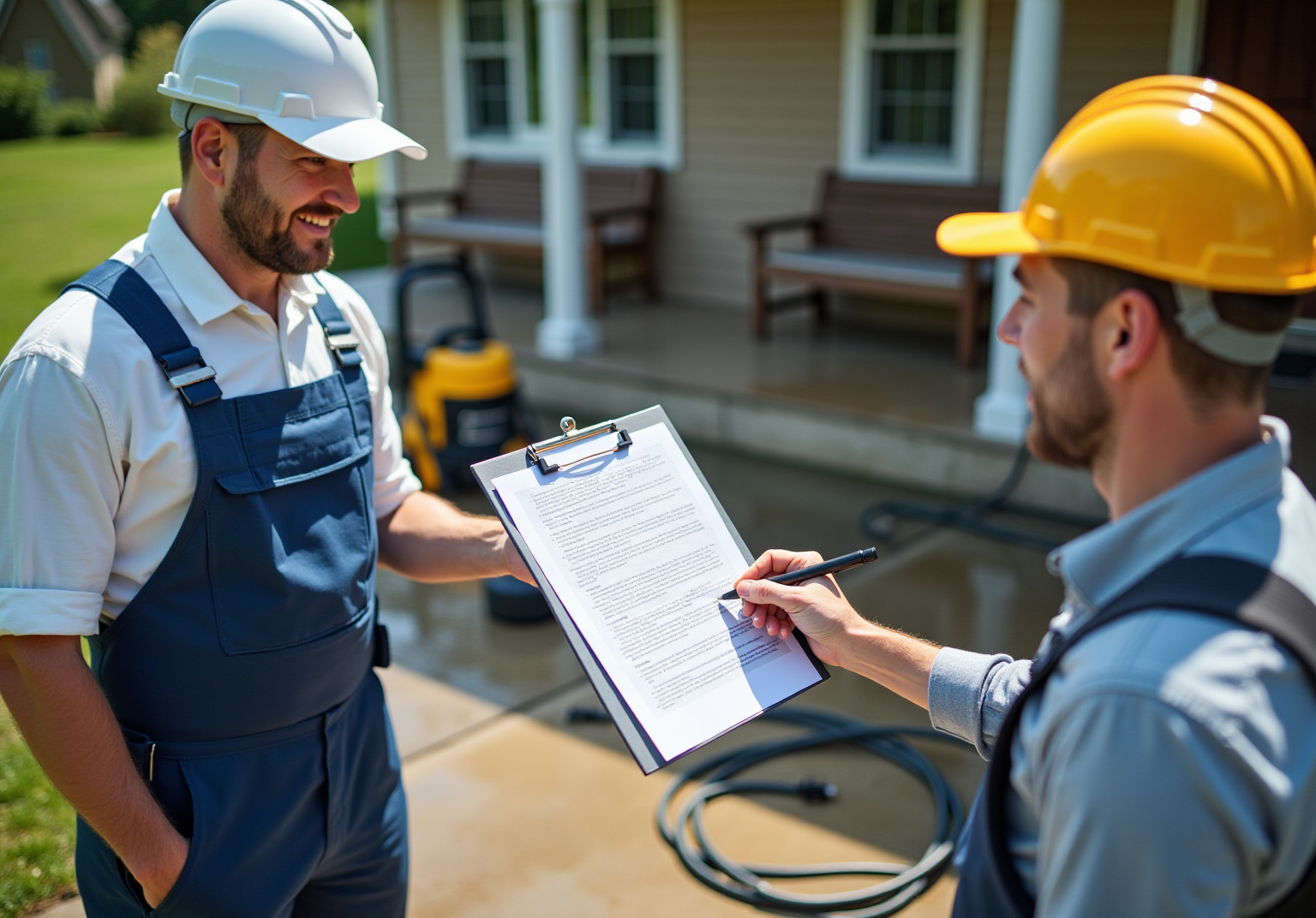Overview
Managing pressure washing contracts can be daunting for many contractors. The challenges of unclear agreements and miscommunication with clients can lead to frustration and lost opportunities. It’s essential to recognize how these issues not only affect your business operations but also your relationships with clients.
Imagine the stress of navigating a project without a clear scope of work or payment terms. This uncertainty can leave you feeling overwhelmed and anxious, impacting your professionalism and client satisfaction. But there’s hope. By mastering well-structured agreements and fostering effective communication, you can transform these challenges into opportunities for growth.
Start by ensuring that every contract outlines a clear scope of work and payment terms. This clarity not only protects you legally but also builds trust with your clients. Additionally, consider strategies for successful bidding and customer management. These practices can significantly enhance your professionalism and lead to happier clients.
Many contractors have shared their relief after implementing these strategies. One contractor noted, “Having a clear contract made all the difference. I felt more confident and my clients appreciated the transparency.” Such testimonials highlight the positive impact of structured agreements on both your business and client relationships.
In conclusion, by focusing on these essential components, you can alleviate the stress associated with pressure washing contracts. Embrace the opportunity to enhance your professionalism and foster stronger connections with your clients. Together, let’s create a community where contractors thrive and clients feel valued.
Introduction
Crafting a pressure washing contract isn’t just a formality; it’s the foundation of a thriving business relationship between contractors and their clients. Many contractors struggle with the challenge of balancing professionalism with the personal touch that fosters lasting customer relationships. This struggle can lead to feelings of frustration and uncertainty, as the pressure to maintain a competitive edge weighs heavily on their shoulders.
Understanding the essential components of a contract, along with the legal protections and effective bidding strategies, is crucial. These elements not only safeguard contractors’ interests but also enhance client satisfaction and trust. However, the complexities of contract execution can often feel overwhelming. How can contractors navigate these challenges while still connecting with their clients on a personal level?
The answer lies in recognizing that a well-crafted contract can serve as a bridge between professionalism and personal connection. By approaching contract creation with empathy and care, contractors can ensure that their clients feel valued and understood. This nurturing approach not only alleviates the stress of contract negotiations but also paves the way for stronger, more trusting relationships in a competitive market.
Define Essential Components of a Pressure Washing Contract
A well-organized pressure washing contract is not just a formality; it’s a vital tool for establishing clear expectations and protecting both the service provider and the client. Without it, misunderstandings can arise, leading to frustration and dissatisfaction. Let’s explore some essential components that can make a significant difference:
-
Scope of Work: It’s crucial to clearly outline the services to be provided, detailing specific tasks, areas to be cleaned, and any special requirements. This clarity helps prevent misunderstandings and sets the stage for successful project execution. Field Complete empowers builders to create detailed service descriptions, ensuring everyone is on the same page from the start.
-
Payment Terms: Transparency in outlining the total cost, payment schedule, and accepted payment methods is key. It helps avoid disputes and ensures that both parties are aligned on financial expectations. Field Complete simplifies this process by allowing builders to generate clear estimates and invoices, making payment collection straightforward and stress-free.
-
Timeline: Specifying start and completion dates, along with contingencies for weather or other potential delays, is essential for managing customer expectations. This foresight allows for better planning. Field Complete’s scheduling capabilities assist in monitoring these timelines efficiently, offering reminders and updates to both workers and customers.
-
Liability Waivers: Including clauses that limit liability for damages during the job is important for protecting both the contractor and the client. This fosters a sense of security in the agreement. Field Complete can help manage documentation related to liability waivers, ensuring they are easily accessible and properly signed.
-
Termination Clause: Clearly specifying the circumstances under which either party can end the agreement ensures that both parties understand their rights and responsibilities. This clarity provides a safety net if needed. Field Complete can store and manage agreement versions, making it easy to reference termination clauses when necessary.
-
Signatures: It’s essential for both parties to endorse the agreement to make it legally binding. This step reinforces the commitment to the agreement and ensures enforceability. Field Complete offers electronic signature capabilities, streamlining the signing process and ensuring that contracts are finalized quickly.
Integrating these elements not only protects the builder’s interests but also fosters trust with customers, which is essential for obtaining pressure washing contracts and maintaining enduring business connections. As Jeremiah from Steps Pressure Washing wisely points out, “Informing customers about possible delays can foster trust and understanding, which is essential in a competitive market.” By following these best practices and utilizing tools like Field Complete, builders can enhance their professionalism and improve client satisfaction, ultimately leading to repeat business and referrals.
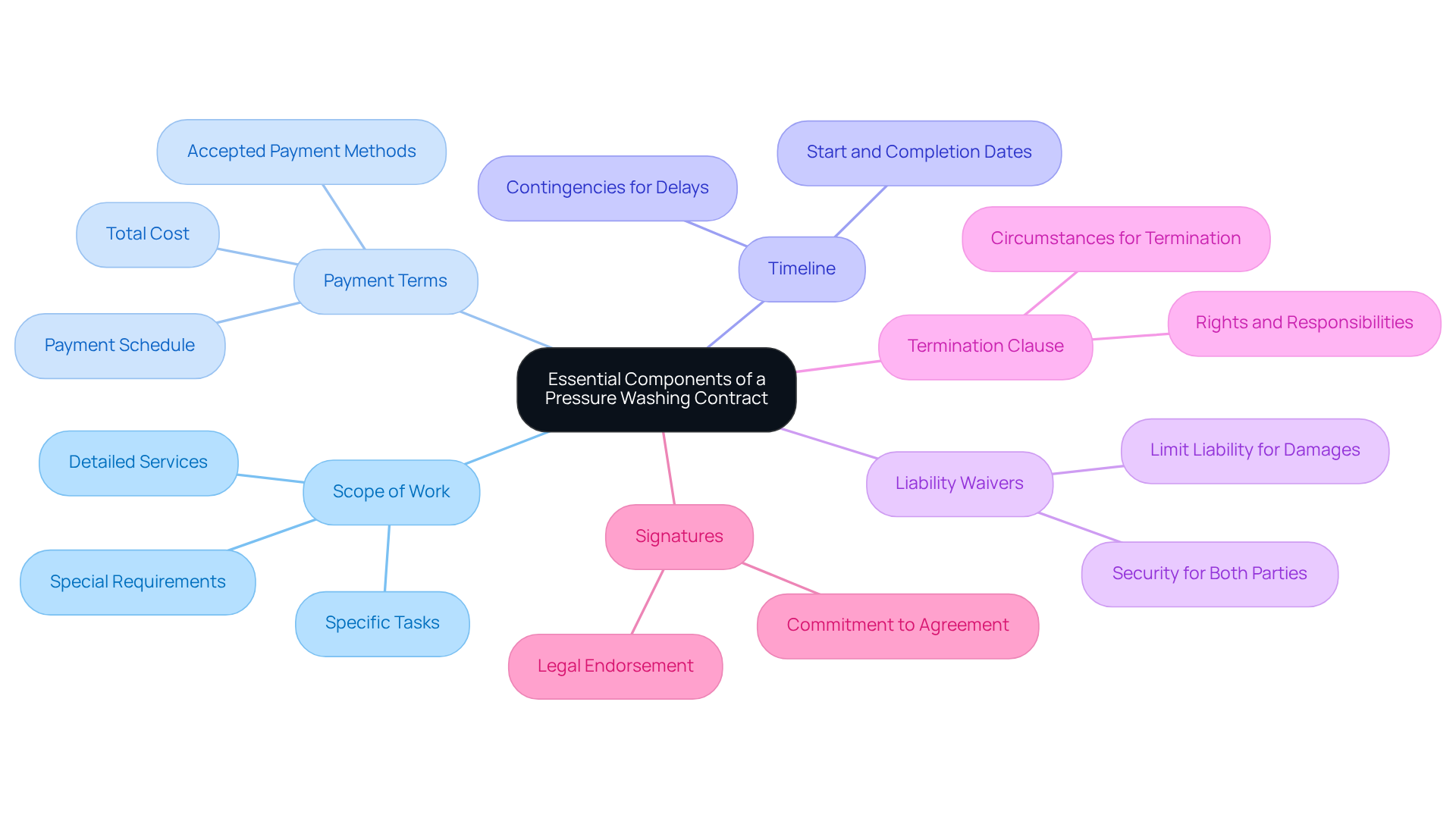
Incorporate Legal Protections and Compliance Requirements
To protect your business and ensure you meet all regulations, it’s essential to consider some key legal protections and compliance requirements that can truly make a difference:
-
Insurance Coverage: Securing general liability insurance is not just a formality; it’s a vital step in safeguarding against potential damages or injuries that could arise during your operations. Did you know that about 77% of builders in the construction sector carry general liability insurance? This makes it a common requirement for commercial contracts. Moreover, those who hold professional liability insurance often experience significantly reduced financial losses when resolving disputes, underscoring the importance of comprehensive coverage.
-
Licensing: It’s crucial to ensure you have the necessary licenses to operate legally in your area. This might include obtaining a business license and specific permits related to pressure washing contracts. Having the right licenses not only keeps you compliant but also builds trust with your clients.
-
Environmental Regulations: Understanding local environmental laws regarding wastewater disposal and chemical usage is essential. Non-compliance can lead to hefty penalties and legal issues, which can be overwhelming. The demand for environmental liability coverage has surged by 21% in 2025 due to stricter regulatory enforcement, highlighting just how important it is to stay informed and compliant.
-
Safety Protocols: Implementing robust safety measures and providing thorough training for your employees is critical to meet OSHA regulations. This commitment not only ensures a safe working environment but also enhances your business’s reputation in the community.
-
Agreement Provisions: Including specific provisions in your agreements that address adherence to local laws and regulations is a smart move. Clearly stating that both parties are responsible for following these requirements can help mitigate risks and clarify expectations, fostering a sense of partnership.
As Duncan & Associates Brokers emphasize, engaging legal and insurance professionals to review your terms can help ensure that your coverage exceeds both statutory and contractual minimums. By proactively addressing these legal aspects, you can reduce risks and enhance your credibility in the competitive pressure washing contracts market. Remember, taking these steps not only protects your business but also contributes to a safer and more compliant industry for everyone.
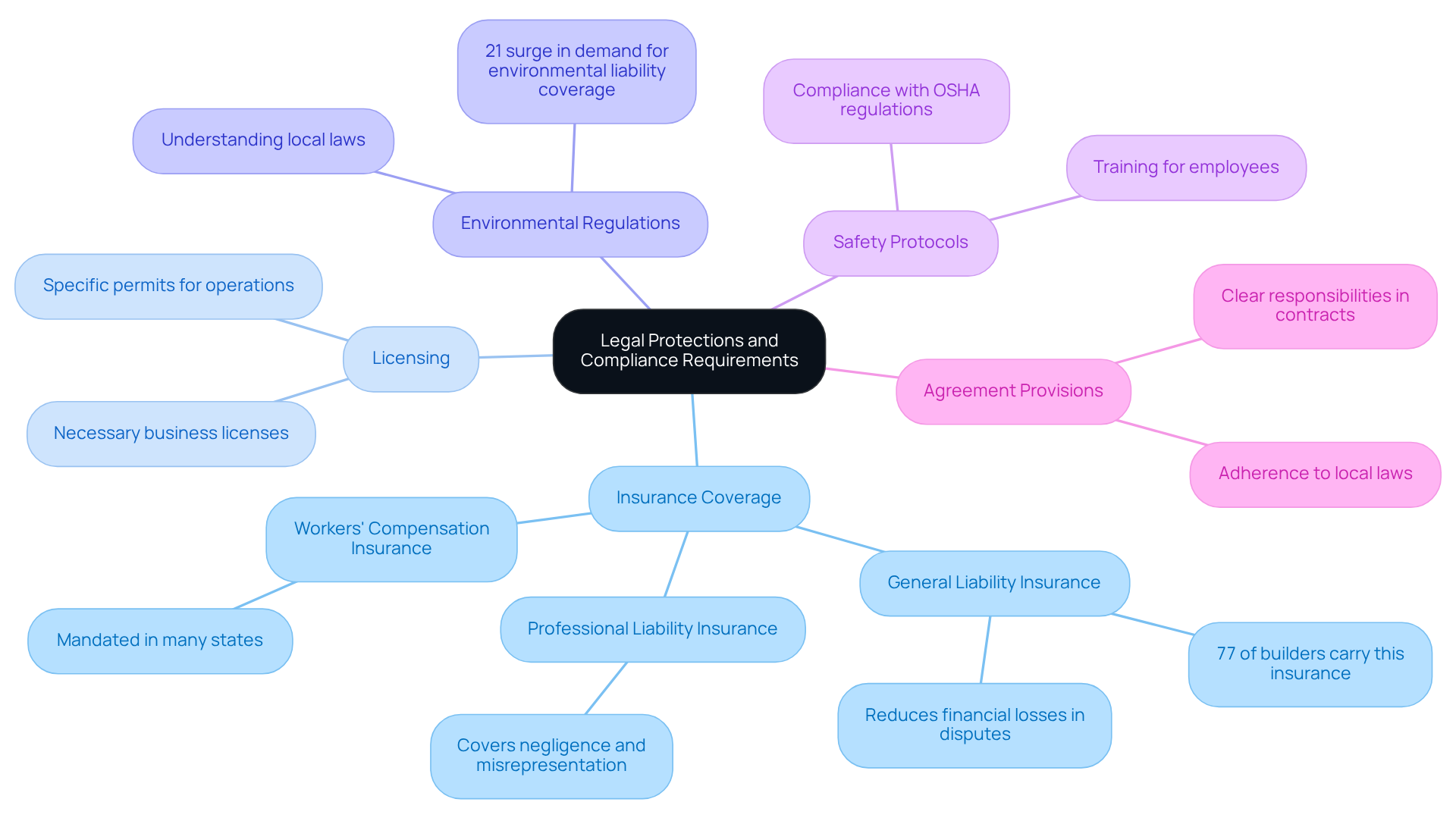
Implement Effective Bidding Strategies for Pressure Washing Contracts
For contractors, securing pressure washing contracts can often feel daunting. The pressure to stand out in a competitive market can weigh heavily on your shoulders. But don’t worry; there are effective strategies you can implement to increase your chances of success.
-
Research Market Rates: Understanding the current rates for pressure washing in your area is crucial. This knowledge not only helps you craft bids that are competitive but also ensures they remain profitable. By being informed, you can present yourself as an attractive option for potential clients, alleviating some of the stress that comes with bidding.
-
Detailed Proposals: Crafting comprehensive proposals is essential. Clearly outlining your offerings, pricing, and the unique value you bring can make a significant difference. Including testimonials or case studies enhances your credibility, and proposals with visual elements like images and videos can close deals 72% faster. This approach not only showcases your professionalism but also builds trust with clients.
-
Utilize Online Platforms: Embracing online bidding platforms can open new doors for you. These platforms expand your reach and enhance your visibility among clients seeking pressure washing solutions. It’s a simple yet effective way to connect with those who need your services, easing the burden of finding contracts.
-
Networking: Building relationships with local businesses and property managers is invaluable. These connections can lead to ongoing contracts and referrals, providing stability for your business. Nurturing these relationships can create a supportive network that benefits everyone involved.
-
Follow Up: After submitting a bid, don’t hesitate to follow up with potential clients. This proactive approach demonstrates your commitment to customer service and allows you to address any questions or concerns they may have. It reinforces your professionalism and shows that you genuinely care about their needs.
By adopting these strategies, you can significantly improve your bidding success in securing pressure washing contracts and solidify your presence in the competitive market. Remember, you’re not alone in this journey; many contractors share similar experiences, and together, we can navigate these challenges.
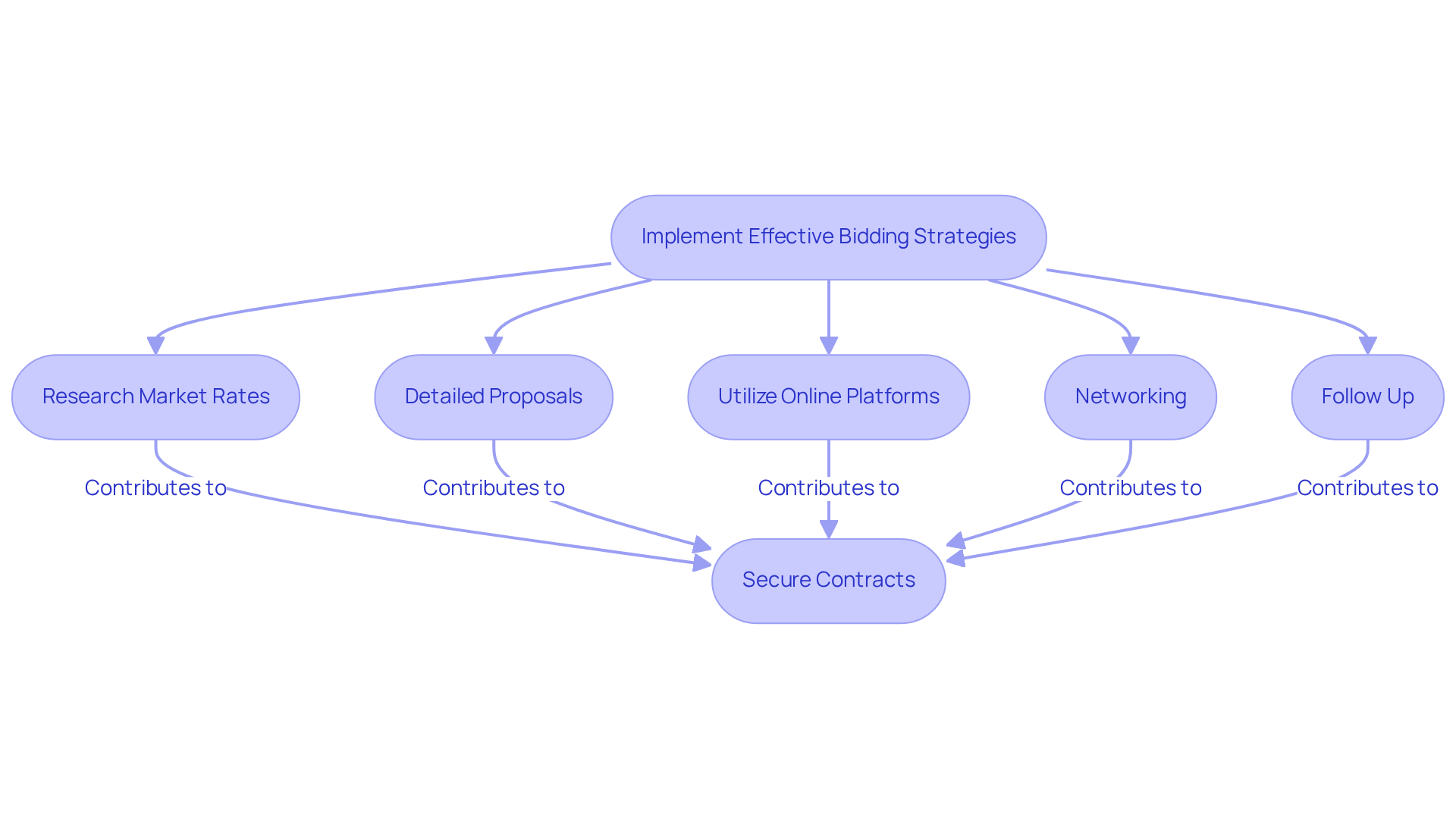
Enhance Communication and Customer Management in Contract Execution
Effective communication and customer management during pressure washing contracts can be challenging for contractors, often resulting in stress and uncertainty. To alleviate these concerns and foster stronger relationships, consider these nurturing practices:
-
Regular Updates: Keeping customers informed about job progress, including any changes to the schedule or scope of work, is crucial. This openness not only fosters trust but also helps reduce customer anxiety, allowing them to feel more secure in the process.
-
Leverage Technology: Embracing customer management software can be a game-changer. By tracking interactions, scheduling appointments, and sending reminders, contractors can ensure that no detail slips through the cracks. Such tools significantly enhance operational efficiency, enabling contractors to manage multiple projects seamlessly and with confidence.
-
Feedback Mechanism: Implementing a system for gathering customer feedback during and after the job is essential. This practice not only identifies areas for improvement but also allows for the prompt resolution of any concerns. By fostering a culture of continuous improvement, contractors can show their commitment to customer satisfaction.
-
Personalized Communication: Adapting your communication style to meet each individual’s preferences—whether through phone calls, emails, or texts—can make a world of difference. Personalization enhances the customer experience and strengthens relationships, making clients feel valued and understood.
-
Post-Job Follow-Up: After completing a job, checking in with customers to ensure their satisfaction and discussing any future requirements reinforces your commitment to excellent service. This simple act can lead to repeat business and long-lasting loyalty.
By focusing on these compassionate communication strategies, contractors can enhance client relationships and foster loyalty, ultimately paving the way for increased business opportunities in pressure washing contracts.
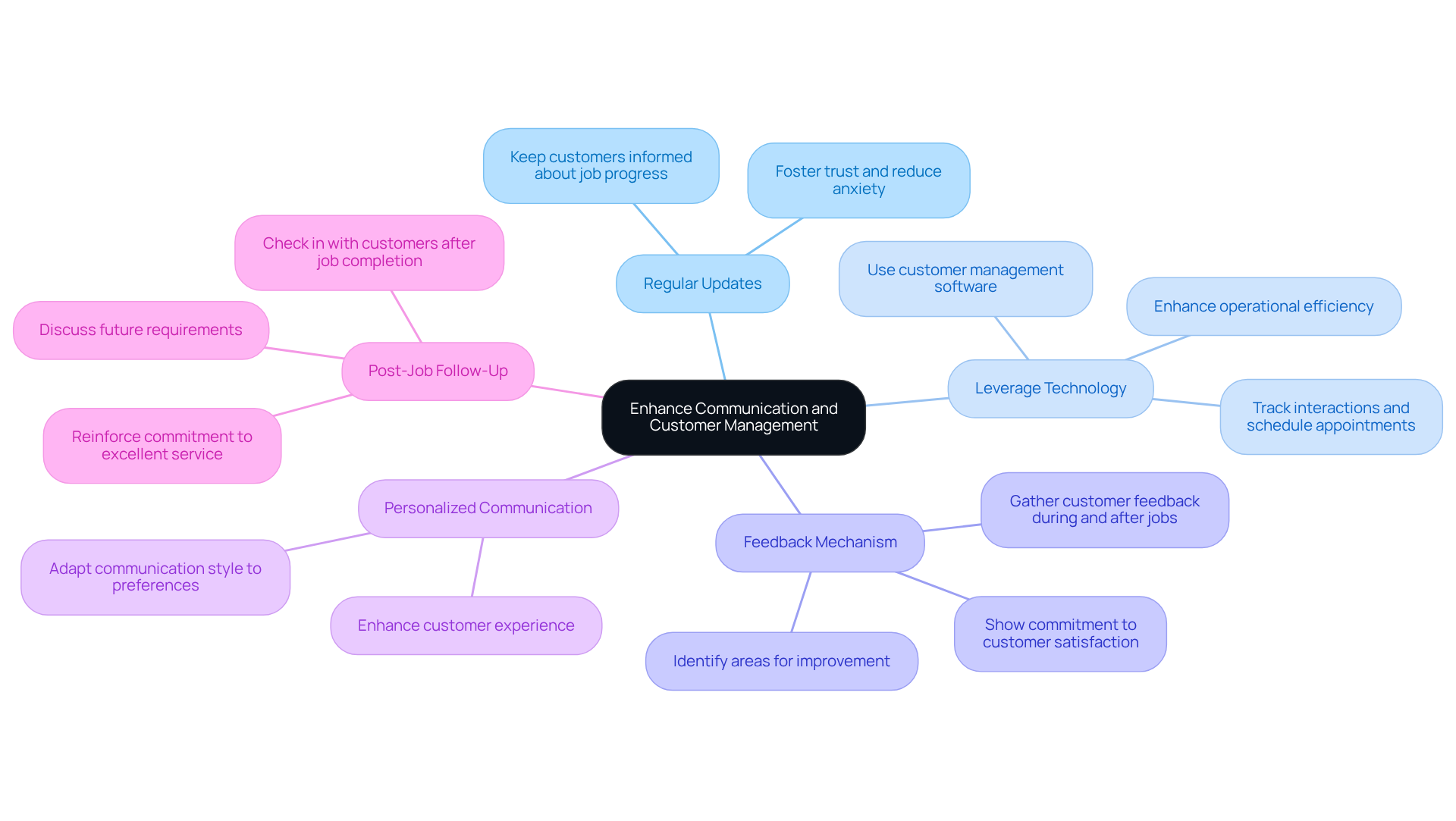
Conclusion
For contractors navigating the competitive landscape of pressure washing, mastering contracts can feel overwhelming. It’s essential to establish clear expectations through well-defined agreements, as this not only protects your interests but also fosters trust with your clients. When you lay this foundation, you enhance your professionalism and set the stage for successful project execution and customer satisfaction.
Key components of an effective pressure washing contract include:
- A detailed scope of work
- Transparent payment terms
- Clear timelines
It’s crucial to incorporate legal protections, such as insurance and compliance with local regulations, to safeguard both you and your clients. Moreover, by implementing effective bidding strategies and enhancing communication throughout the project, you can significantly improve client relationships, paving the way for repeat business.
Ultimately, the success of your pressure washing contracts hinges on meticulous planning, clear communication, and a commitment to quality service. By embracing these best practices, you can secure contracts and build lasting relationships that contribute to sustained growth and success in the industry. Taking proactive steps today will not only lead to a more secure future but also foster a prosperous journey in the pressure washing business.
Frequently Asked Questions
What is the purpose of a pressure washing contract?
A pressure washing contract establishes clear expectations and protects both the service provider and the client, helping to prevent misunderstandings that can lead to frustration and dissatisfaction.
What should be included in the scope of work section of the contract?
The scope of work should clearly outline the services to be provided, detailing specific tasks, areas to be cleaned, and any special requirements to ensure everyone is on the same page.
Why are payment terms important in a pressure washing contract?
Payment terms are crucial for transparency regarding the total cost, payment schedule, and accepted payment methods, which helps avoid disputes and aligns both parties on financial expectations.
How does specifying a timeline benefit the pressure washing contract?
Specifying start and completion dates, along with contingencies for potential delays, helps manage customer expectations and allows for better planning.
What is the role of liability waivers in a pressure washing contract?
Liability waivers include clauses that limit liability for damages during the job, protecting both the contractor and the client and fostering a sense of security in the agreement.
What is a termination clause, and why is it necessary?
A termination clause specifies the circumstances under which either party can end the agreement, ensuring both parties understand their rights and responsibilities, which provides a safety net if needed.
Why are signatures important in a pressure washing contract?
Signatures are essential for making the agreement legally binding, reinforcing the commitment to the terms and ensuring enforceability.
How can tools like Field Complete assist in managing pressure washing contracts?
Field Complete can help create detailed service descriptions, generate clear estimates and invoices, manage documentation related to liability waivers, store agreement versions, and streamline the signing process with electronic signature capabilities.
List of Sources
- Define Essential Components of a Pressure Washing Contract
- Mastering Pressure Washing Quotes: Essential Business Tips (https://pressurewashingtribe.com/mastering-pressure-washing-quotes-tips-for-new-business-owners)
- How to Quote Pressure Washing Jobs: Commercial Pressure Washing Quote Template – Hotsy of Houston (https://hotsyhouston.com/how-to-quote-pressure-washing-jobs)
- Pressure Washing Business Proposal: #1 Ultimate Guide (https://cleanmarketing.net/creating-a-pressure-washing-business-proposal)
- Pressure Washing Contracts: How to Protect Your Business and Win Work (https://getjobber.com/academy/pressure-washing/pressure-washing-contracts)
- Pressure Washing Business Plan (https://upmetrics.co/template/pressure-washing-business-plan-example)
- Incorporate Legal Protections and Compliance Requirements
- Contractors Insurance Market Size & Share 2025-2032 (https://360iresearch.com/library/intelligence/contractors-insurance)
- Construction Insurance Industry Statistics: Market Growth, Costs, and Challenges (https://coinlaw.io/construction-insurance-industry-statistics)
- Contractors’ Insurance in the US Industry Analysis, 2024 (https://ibisworld.com/united-states/industry/contractors-insurance/5916)
- The Importance of Insurance for Independent Contractors – Duncan Insurance (https://duncanins.com/the-importance-of-insurance-for-independent-contractors)
- Contractor Insurance Market Size, Share and Growth | Forecast by 2026 (https://alliedmarketresearch.com/contractor-insurance-market)
- Implement Effective Bidding Strategies for Pressure Washing Contracts
- Pressure Washing Pricing Guide: A Complete Overview – Joist (https://joist.com/blog/pressure-washing-pricing-guide)
- Pressure Washing Industry Statistics: Industry Analysis for 2025 (https://housecallpro.com/resources/pressure-washing-industry-statistics)
- Winning Proposal Structure Tips (What The Research Says) | Proposify (https://proposify.com/blog/proposal-structure-tips)
- How Much to Charge for Pressure Washing? A Business Guide (https://freshbooks.com/hub/estimates/estimate-power-washing-jobs?srsltid=AfmBOoo7MyZ9lyqiSZbJ_BkRmUZegWilKeXHCSeLQx873O32K78yr3Xy)
- The State of Proposals 2024 | Proposify (https://proposify.com/state-of-proposals-2024)
- Enhance Communication and Customer Management in Contract Execution
- CRM Statistics That Prove CRM Helps Increase Revenue [2025] (https://nutshell.com/blog/crm-stats)
- 21 Customer Experience Statistics That Prove CX = Growth (https://superoffice.com/blog/customer-experience-statistics)
- Customer Experience In The Service Industry Statistics Statistics: ZipDo Education Reports 2025 (https://zipdo.co/customer-experience-in-the-service-industry-statistics)
- Understanding CRM for Contractors: Key Features and Benefits – Field Complete (https://fieldcomplete.com/blog/customer-service-excellence/understanding-crm-for-contractors-key-features-and-benefits)
- 35 customer experience statistics to know for 2025 (https://zendesk.com/blog/customer-experience-statistics)
